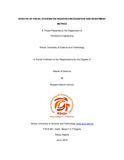| dc.description.abstract | Petroleum reserves are affected either negatively or positively by the type of fiscal system and elements governing them. Governments, investors, policymakers, and other stakeholders have from the past been a victim of the difficulties of the reserve recognitions. This has influenced investment decisions as well as affected the attractiveness of the project. By the use of economic indicators for analysis, the host government will be able to design an efficient fiscal system and the contractor will have reliable parameters to determine the economic viability of the petroleum project. Fiscal elements such as royalty, taxes, and bonuses are linked to the variations in production parameters in order to address the mutuality of interest of the host government and contractor thereby making the fiscal system progressive. Therefore, this thesis presents research into the effects of fiscal systems on reserves recognition, estimations, and investment metrics, as well as the analysis of the progressiveness and regressiveness of the petroleum fiscal systems and their effects on reserves recognition and investment. | en_US |

